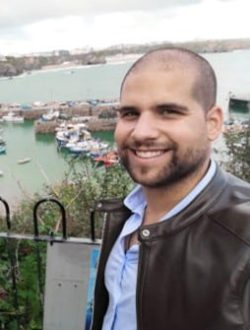Biography
Daniel C. Dinis received the M.Sc. degree in Electronics Engineering and Telecommunications and the Ph.D. degree in Telecommunications from the University of Aveiro (Aveiro, Portugal), in 2013 and 2019, respectively. He also holds an Executive MBA from the Quantic School of Business and Technology (Washington DC, USA) completed in 2021.
His career spans academia, research institutions, industry, and institutional agencies with roles at Instituto de Telecomunicações (Aveiro, Portugal), Mitsubishi Electric Research Labs (Cambridge, US), Thales (Hengelo, Netherlands), Airbus Defence and Space (Portsmouth, UK) and All.Space (Reading, UK).
He currently serves as a Satcom Space Segment Engineer contracted by Starion at the European Space Agency (ESA) in Harwell, UK, where he manages industrial technology and product development projects for the telecom space segment.
Daniel has co-authored over 20 papers in international journals and conference proceedings and is a co-inventor of 6 U.S. patents. His work has earned several recognitions, including the Best Live Demo Award of the XIII “Jornadas sobre Sistemas Reconfiguráveis”, an Honourable Mention in the 2018 IBM Scientific Award, and Third Prize in the 2020 Fraunhofer Portugal Challenge (Ph.D. category).
He has served as a reviewer for several journals, including IEEE Transactions on Microwave Theory and Techniques, IEEE Microwave and Wireless Technology Letters, International Journal of Microwave and Wireless, IEEE Transactions on Circuits and Systems II, and Elsevier’s Microprocessors and Microsystems.
Since 2023, he has been part of the management team of the ESA-funded Satellite Network of Experts V (SatNEx-V) and is a member of the IEEE MTT-s Technical Committees TC-23 and TC-29. He also served on the technical committee of the 5th ESA Workshop on Advanced Flexible Telecom Payloads.
His current research interests include Satellite Communications (Payloads, Flat Panels User Terminals), Phased Arrays – covering the full chain from antenna to modem, including analog to digital beamforming and calibration aspects – RF Systems and Digital Signal Processing, Software-Defined Radios and FPGA Technology, and Hardware-Software Co-design and Modelling.
